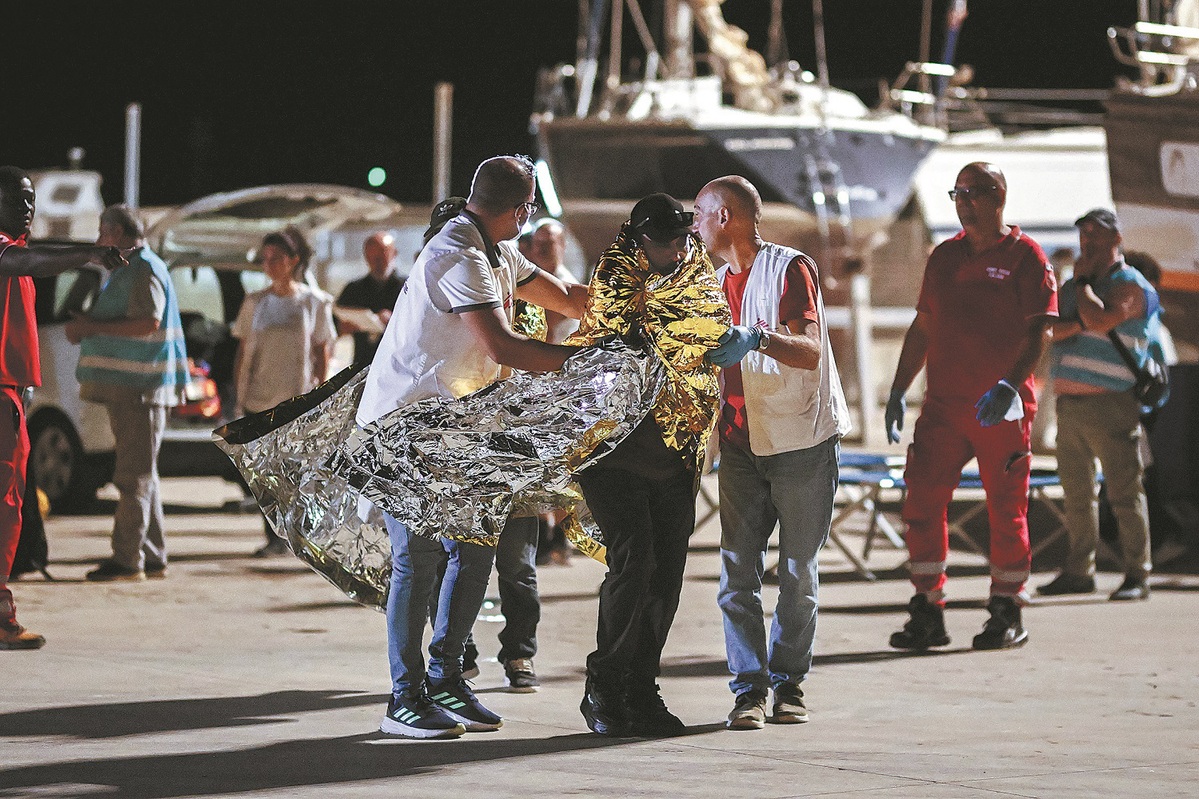Far right drives Europe's migration policy
Continent faces mounting challenges as public sentiment shifts, political divisions deepen
By Julian Shea in London | China Daily | Updated: 2025-01-03 04:01

Warning to all
However, Eva Singer, from the Danish Refugee Council, told Euronews that Italy's experience should be a warning to all.
"EU countries are talking about (outsourcing) as if you can just decide what happens outside of the EU, but we're talking about independent countries that have their own interests," she said. "I don't see why these countries would accept taking over the responsibility from Europe."
For the second half of 2024, Hungary held the rotating presidency of the Council of the European Union, and in October, Prime Minister Viktor Orban made his position clear.
"I have been chest-deep in the bloodbath of the migration debate for quite some time," he said. "Since 2015, I have been saying the same thing: We can try all kinds of pacts, but there is only one way to control migration — the external hot spot.
"The only immigrants who stay out are the ones we don't let in ... in the end, there will be agreement between states to have external hot spots."
Meloni and Orban met twice during Hungary's presidency, and after their second meeting they issued a joint statement confirming their commitment to tackling irregular migration through "enhanced collaboration with countries of origin and transit".
Although, as someone who has attained power, Meloni may be seen as a standard-bearer for Europe's right-wing parties, the reality is more nuanced.
"In the elections in 2022 (when Meloni came to power), a record low number of Italians voted, just 63.7 percent, a 20 percent drop compared to the 2008 election," Simona Guerra, a senior lecturer in comparative politics at the University of Surrey in England, told China Daily.
"At the European elections, commentators expected massive gains for the radical right, which happened to a degree, but with the vote in Germany (Alternative for Germany finished with the second-largest vote share) and France (National Rally won nearly one-third of the vote) disproportionately affecting the overall figures."
Meloni's confidence in the Italy-Albania deal was enough for von der Leyen to tell EU leaders "we will also be able to learn from this practical experience".
Reality has proved otherwise, however, with the deal so far involving great outlay and no concrete results.
"The operation costs 9 million euros ($9.3 million) annually to Italian taxpayers and the cooperative managing the hub was awarded a 133-million-euro contract," Guerra said.
"At the same time, according to the Italian Statistics Institute, there are now more than 5 million Italians (9.7 percent of population) living in absolute poverty. Also, the agreement between the two prime ministers bypassed the Albanian constitution, which would have required the consent of the president of the republic."
In the European Parliament, the Patriots for Europe bloc, which includes Orban's Fidesz party, supports the idea of external repatriation centers, so is Meloni really an inspiration in this way? "Not according to European law," Guerra said.
However, Meloni remains committed to the policy, going as far as to say in a speech in December that "the centers … in Albania will work, even if I have to spend every night there from now until the end of the (term of the) Italian government".
Guerra explained, "It enables her to control two narratives — on one side the protection of the country, and the other the hostility of the judiciary, against the interests of the nation."
Comparative stability
With France in a state of turmoil, and Germany facing an election next month, Meloni represents a figure of comparative stability on the European political landscape.
In addition, Donald Trump's return to the White House as president will turn world politics on its head, with huge implications for migration and for Europe — he has already promised mass deportations in the United States — and the increased likelihood of the Russia-Ukraine conflict ending, meaning more turmoil and displacement there, which will have a huge impact on Europe.
Trump's second presidential term is the great unpredictable event for world politics in 2025, but for Meloni, it could be a chance to entrench herself as the leader of the European right, as she has a history with him.
In 2018, Trump's adviser Steve Bannon attended Meloni's Atreju political festival, and in 2020, she was a guest at Trump's Washington National Prayer Breakfast.
Before he is back in office, Meloni is positioning herself to be a bridge between Brussels and Washington. "She has been telling the Italian Parliament not to be hostile to Trump, as it doesn't create conversation," Guerra said.
How Europe's challenge in handling migration in 2025 changes remains to be seen, but the issue will not go away.
























